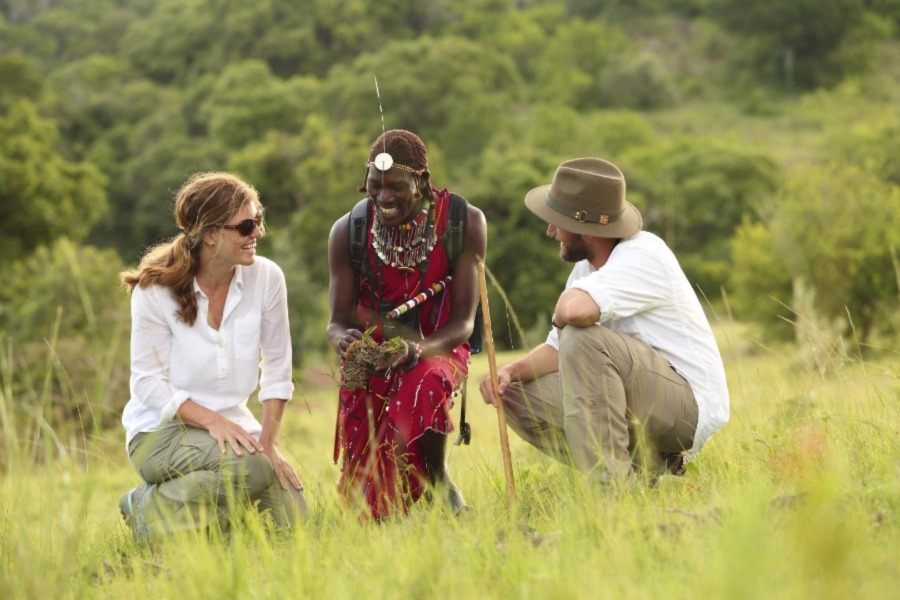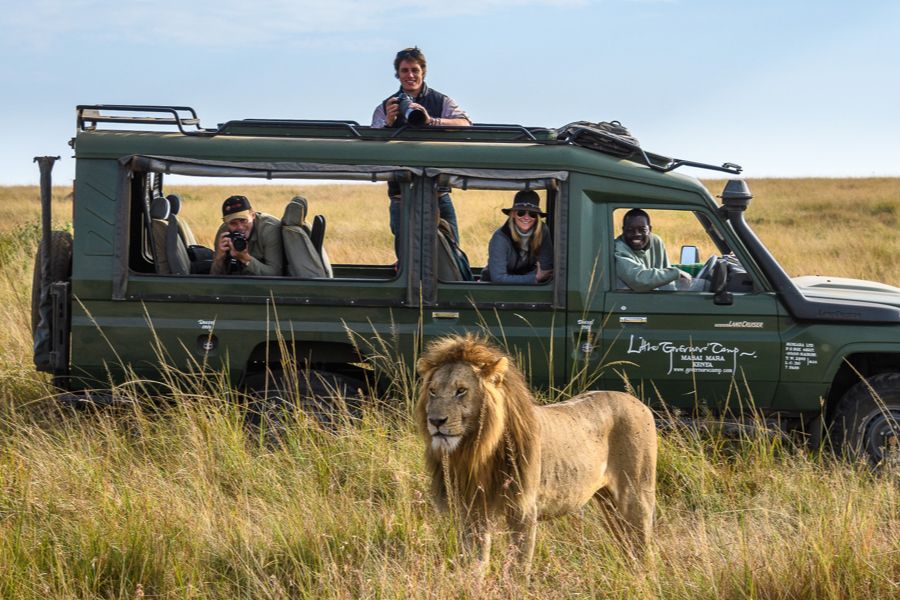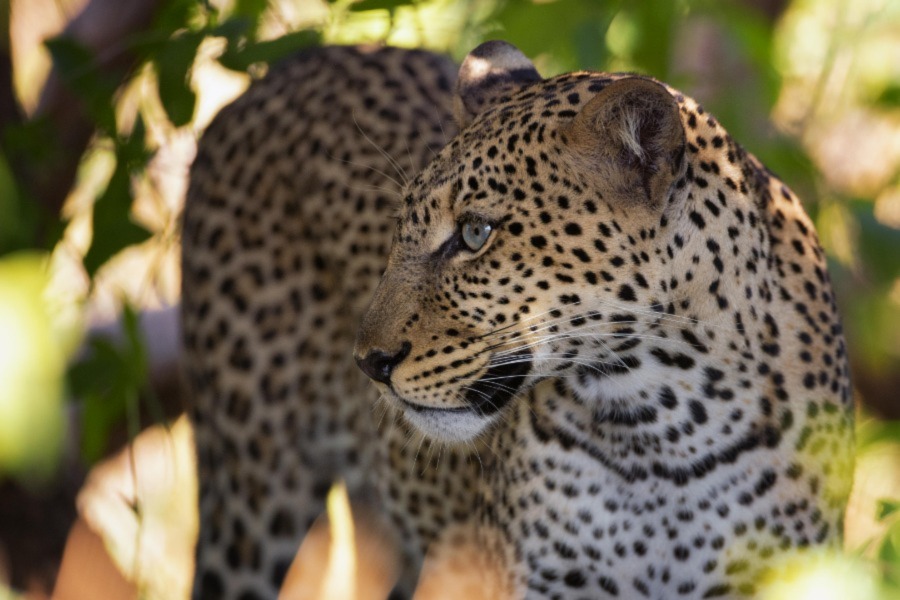Welcome to Kenya, one of the top safari destinations in Africa! With its breathtaking landscapes, abundant wildlife, and luxury lodges, it’s no secret why Kenya is a must-visit. Whether you’re a novice or a seasoned adventurer, it’s important to be well-prepared for your safari experience. And that’s where we come in!
At Stories and Experiences Travel, we believe in engaging, complimenting, and rewarding people. We are proud of the African nature and wildlife, and we want people from all over the world to come and see them. That’s why we specialize in helping tourists from Europe and the USA plan their dream safari in Africa.
When it comes to packing for your Kenya safari, we understand that you want to keep your luggage to a minimum. After all, more space for cameras means more opportunities to capture those unforgettable moments. That’s why we’ve created this Kenya safari packing list to help you pack only the essentials for your trip.
What are the Different Seasons in Kenya?

Kenya is divided by the equator and enjoys a mostly tropical climate with regional variances. Throughout the year, Kenya experiences two rainy seasons and two dry seasons, each with its own charm and unique conditions. Depending on when you choose to visit, what you decide to wear on safari in Kenya can make all the difference between a pleasurable experience and a rather uncomfortable one. But don’t worry, our expert guides will help you navigate the seasons and ensure you have the best safari experience.
Dry Seasons: June – October & January – February
The dry seasons in Kenya are the best time to visit for open-air vehicle safaris and immersive walking safaris. With less rainfall, animals gather around watering holes, making them more visible. It’s the perfect time to witness the incredible wildlife in action.
Rainy Seasons: March – May & November – December
If you prefer to avoid the peak-season crowds and take advantage of off-season rates, the rainy seasons are worth considering. Although there may be more rainfall, it’s a great opportunity to experience Kenya’s natural beauty without the crowds.
What Should You Pack for a Safari in Kenya?
Clothing

When it comes to clothing, it’s important to pack both warm and cool clothes as temperatures can vary throughout the day. Stick to neutral colors like khaki, green, beige, and brown to blend in during game spotting. Here’s a list of essential clothing items to include in your Kenya safari packing list:
- Sufficient amount of socks and underwear
- Light, long-sleeved shirts (linen and cotton)
- Warm, windproof jackets
- Sweaters and beanies
- Jeans and warm pants
- Dresses or shorts
- Broad-rimmed hats and sunglasses
- Waterproof boots
- Raincoats
- Comfortable closed shoes and sandals
- Swimming costume
- Warm and cool pajamas
- Backpack or fanny pack
- Sarong or kikoi
Tech & Gear

Aside from clothing, there are other essential items you’ll need for your Kenya safari. Whether you’re a tech guru or not, capturing the memories made on your safari is important. Here’s a checklist of tech and gear to include in your packing list:
- Camera
- Cellphone
- Memory cards
- Chargers for all electronics
- Binoculars
- Headlamp or flashlight
- Country-specific adaptor plugs
Toiletries

While some camps and lodges in Kenya offer shops selling essential items, it’s always best to pack your own toiletries to ensure you have what you need at all times. Here’s a list of toiletries to include in your packing list:
- Insect repellent
- Bug bite remedies
- Sunscreen
- Shampoo and conditioner
- Moisturizer
- Aftersun lotion
- Hand sanitizer
- Deodorant
- Lip balm
- Applicable medication
- Rehydration & electrolyte sachets
Travel Documents

Before embarking on your Kenyan safari, it’s crucial to have the right travel documents in order. To ensure a stress-free vacation, make sure you have the following documents:
- Visa
- Passport
- Identity document
- Emergency contact numbers
- Lodge contact numbers
- Medical certificates
- Maps and guide books
- COVID-19 PCR test certificate (fully vaccinated travelers are exempt from PCR testing)
- There will be no paper verification of COVID-19 test results and vaccination certificates upon arrival in Kenya. All travelers must upload both documents to the Global Haven platform before boarding an airplane
- Travel insurance papers
- Traveler Health Surveillance form
What Should You Not Bring to Kenya?

It’s important to note that Kenya has implemented a single-use plastic ban to protect the environment and wildlife. Therefore, it’s crucial to avoid bringing any single-use plastics with you. Here are some of the common single-use plastics that are banned in Kenya:
- Zip-lock bags
- Grocery bags
- Garbage bags
- Duty-free bags
- Plastic water bottles
- Plastic bread bag tags
- Styrofoam takeaway containers
- Straws
- Plastic packaging materials
- Plastic cutlery
Packing for a safari in Kenya doesn’t have to be overwhelming. Remember to pack smart and keep it minimal. Most lodges and camps provide laundry services, so you can rewear items multiple times. Our expert guides at Stories and Experiences Travel are here to help you plan the perfect safari. Contact us today to tailor-make an itinerary that’s right for you!
Embark on a Thrilling Kenyan Safari: Unleash Your Inner Adventurer with this Essential Packing Guide!
Are you ready to embark on a once-in-a-lifetime adventure? Look no further than the breathtaking landscapes and abundant wildlife of Kenya. A Kenyan safari promises an unforgettable experience, where you can witness majestic animals in their natural habitat and immerse yourself in the rich cultures and traditions of this diverse African country. But before you set off, ensure you have everything you need by following this essential packing guide.
1. Clothing: The key to a successful safari is comfort. Opt for lightweight, breathable clothing that will protect you from both the scorching sun and pesky insects. Long-sleeved shirts and long pants made from quick-drying materials are essential to shield yourself from the elements. Neutral colors such as khaki, beige, or olive green are advisable as they blend in with the surroundings and minimize attention from wildlife.
2. Footwear: A sturdy pair of closed-toe shoes or hiking boots is a must-have for navigating the rugged terrain. Comfortable socks will prevent blisters during long walks and provide extra cushioning.
3. Hat and Sunglasses: Protect yourself from the fierce African sun with a wide-brimmed hat that shields your face and neck. Sunglasses with UV protection are essential to safeguard your eyes from the sun’s glare.
4. Insect Repellent: The African bush is known for its abundance of mosquitoes and other insects, some of which may carry diseases such as malaria. Investing in a high-quality insect repellent with DEET or another effective ingredient is crucial to ward off these pesky critters.
5. First Aid Kit: A comprehensive first aid kit is essential for any travel adventure. It should include basics such as adhesive bandages, antiseptic cream, pain relievers, and any prescribed medications you may need.
6. Binoculars and Camera: Don’t forget to capture those incredible wildlife moments! Pack a pair of binoculars to spot animals from a distance, and a camera or smartphone with extra batteries and memory cards to snap away and create lasting memories.
7. Travel Documents: Ensure you have all necessary travel documents in order before embarking on your safari. This includes a valid passport, visa (if required), and any relevant permits or medical certificates. It is also advisable to have printed copies of your flight tickets, accommodation bookings, and emergency contact numbers.
8. Personal toiletries and Hygiene Products: While some accommodations may provide basic toiletries, it is always wise to bring your own. Include essentials such as toothbrush, toothpaste, soap, shampoo, and sunscreen, ensuring they comply with airline regulations and are properly packed in leak-proof containers.
9. Cash and Cards: Remember to bring enough cash in either the local currency or US dollars for tipping, small purchases, and emergencies. Credit and debit cards are widely accepted in major tourist areas, but it is advisable to carry some backup cash.
10. Respectful Attire: Kenya is a country of vibrant cultures and traditions, and it is important to dress modestly and respectfully when interacting with local communities or visiting religious sites. Pack lightweight, conservative clothing that covers your shoulders and knees to ensure you are welcomed and respected in all situations.
As you embark on your Kenyan safari, it is important to remember that packing light is key. Limit your luggage to the essentials and leave room for the incredible experiences and souvenirs you will undoubtedly encounter along the way.
Now that you are armed with this essential packing guide, unleash your inner adventurer and open yourself to the wonders of Kenya. Prepare for breathtaking encounters, heart-pounding moments, and memories that will last a lifetime. Welcome to the wild side of Africa! rnrn
Ready to plan your dream safari in Kenya? Seek expert guidance and let us help you create the perfect itinerary. Contact Stories and Experiences Travel today for a free safari planning consultation!
Unleash Your Inner Adventurer: Embark on a Thrilling Kenyan Safari with this Must-Have Packing Guide!
Are you ready to embark on a journey that will awaken your inner adventurer? A Kenyan safari is an experience like no other, immersing you in the breathtaking beauty of wildlife and landscapes. As you prepare for this remarkable adventure, proper packing becomes essential to ensure a smooth and enjoyable expedition. In this article, we present a must-have packing guide that will guarantee you’re well-equipped to embrace the wonders of a Kenyan safari.
First and foremost, let’s talk about the essentials for your trip. Safari clothing should be comfortable and suitable for the African climate. Lightweight, breathable, and quick-drying fabrics are recommended, as the weather can be hot and humid. Pack a mix of long-sleeved and short-sleeved shirts, as well as a few pairs of long pants and shorts. Don’t forget to include a wide-brimmed hat and sunglasses to protect yourself from the sun’s rays.
Since you’ll be spending most of your time in the great outdoors, a sturdy pair of walking shoes is a must. Opt for comfortable closed-toe shoes to protect your feet from potential hazards while allowing you to explore the terrain with ease. It’s also essential to pack a pair of sandals or flip-flops for relaxation during downtime at the lodges or camps.
Before setting off on your safari, make sure to pack a range of toiletries. Sunscreen with a high SPF is crucial to protect your skin from the sun’s harmful rays. Insect repellent is another essential, as mosquitoes can be abundant in certain areas. It’s advisable to bring a first aid kit that includes basic medications and any personal prescriptions you may require. Don’t forget to pack wet wipes and hand sanitizer for hygiene purposes while on the go.
As you venture into the African wilderness, it’s vital to carry some essential accessories. A good quality camera with extra batteries will allow you to capture unforgettable moments as you encounter magnificent wildlife up close. Remember to bring sturdy binoculars to enhance your wildlife viewing experience, ensuring you don’t miss any fine details. Additionally, a power bank or portable charger will prove invaluable for keeping your electronic devices charged throughout your trip.
Since safaris often entail long drives between destinations, packing certain entertainment items is recommended. Books, magazines, or a tablet loaded with movies or documentaries are great options for passing the time during these journeys. However, don’t forget to soak in the captivating scenery and keep your eyes peeled for any wildlife sightings along the way!
Lastly, it’s important to pack appropriate travel documents and personal items. Ensure you have a valid passport with at least six months’ validity remaining. Don’t forget to carry a printout of your e-visa or any necessary permits. A money belt or a secure travel wallet is essential for keeping your valuables safe. It’s also wise to bring a reusable water bottle and a refillable water purifier to stay hydrated throughout your safari.
In conclusion, a Kenyan safari promises an exhilarating journey that will awaken the adventurer within you. Proper packing is essential to ensure a seamless and enjoyable expedition. Remember to include safari clothing, comfortable walking shoes, toiletries, essential accessories, entertainment items, and necessary travel documents and personal items. By following this must-have packing guide, you’ll be well-prepared to embark on a thrilling Kenyan safari, creating memories that will last a lifetime. So, pack your bags, unleash your inner adventurer, and prepare for the journey of a lifetime!
Experience the Ultimate Adventure: Discover the Thrills of a Kenyan Safari with Our Essential Packing Guide!
Embarking on a Kenyan safari is an unforgettable experience that promises exceptional wildlife encounters, breathtaking landscapes, and a taste of authentic African culture. However, proper preparation is key to ensure that your adventure is nothing short of extraordinary. To guide you through the process, we have curated an essential packing guide that will help you make the most out of your Kenyan safari.
Clothing:
When it comes to clothing, it is crucial to pack light and breathable garments, suitable for the warm and often humid Kenyan climate. Opt for neutral-colored clothes that blend well with the natural surroundings and assist in minimizing your presence, allowing you to observe wildlife more easily. Pack long-sleeved shirts and pants to protect against mosquito bites and the scorching sun. Additionally, don’t forget to include a wide-brimmed hat, sunglasses, and a lightweight raincoat to prepare for unpredictable weather changes.
Footwear:
Comfortable footwear is essential to enjoy long hours of wilderness exploration. Invest in sturdy, closed-toe shoes or boots that provide good ankle support. It is advisable to break in your shoes before the safari to avoid discomfort or blisters during your adventure. Additionally, pack a pair of lightweight, breathable sandals or flip-flops for relaxing at the lodge or during downtime.
Binoculars and Camera Equipment:
A Kenyan safari offers incredible opportunities to observe and capture wildlife in its natural habitat. Make sure to bring a good quality pair of binoculars to enhance your wildlife viewing experience. Consider the magnification and durability of the binoculars to suit your preferences. Moreover, arm yourself with a reliable camera to document the awe-inspiring moments you encounter. Whether you prefer a digital camera or a professional DSLR, ensure that you have enough memory cards and batteries to last the duration of your trip.
Electronics:
While immersing oneself in the splendid wilderness of Kenya is the primary goal, it is always wise to carry a few electronic essentials. Don’t forget to pack a universal power adapter to recharge your devices. If you plan to work remotely or stay connected with loved ones during your safari, a laptop or tablet can prove invaluable. However, remember to keep your electronics in waterproof and dustproof bags for protection against the elements.
Toiletries and Medications:
Kenya’s safaris often take travelers away from the amenities of modern civilization. Therefore, it is important to pack a basic travel-sized toiletry kit containing essentials such as toothpaste, toothbrush, soap, shampoo, and sunscreen. Additionally, it is advisable to carry a first aid kit with necessary medications, insect repellent, and any prescription drugs you may require. Consult with your healthcare provider or travel clinic beforehand for any necessary vaccinations or additional medical precautions.
Travel Documents:
Before embarking on your safari adventure, ensure that you have all the required travel documents in order. This includes a valid passport, visa, and any necessary permits. It is always wise to make copies of these documents and store them in a separate location from the originals. Moreover, remember to carry sufficient cash or a valid credit card for emergencies, tips, or any remote areas where card payments may not be accepted.
Kenya is a land of dramatic landscapes, mesmerizing wildlife, and vibrant cultures. By adequately preparing for your safari adventure with our essential packing guide, you will undoubtedly be ready to immerse yourself in the thrill and wonder that Kenya has to offer. So, pack wisely, embrace the unknown, and get ready to embrace the ultimate adventure of a Kenyan safari! rnrn
Title: Experience the Ultimate Adventure: Discover the Thrills of a Kenyan Safari with Our Essential Packing Guide!
Introduction:
Embarking on a Kenyan safari is an unparalleled adventure that offers travelers the opportunity to immerse themselves in the breathtaking landscapes and wildlife of one of Africa’s most diverse and remarkable countries. However, to make the most of your safari experience, thorough preparation and packing is essential. In this comprehensive guide, we will outline the key items you need to include in your packing checklist to ensure a successful and enjoyable Kenyan safari.
1. Clothing:
When packing for a Kenyan safari, it is important to select clothing that prioritizes comfort, durability, and protection from the sun and insects. Lightweight, breathable, and neutral-colored clothing is recommended, as it minimizes overheating and helps you blend into the natural surroundings. Essentials include long-sleeved shirts, long pants, wide-brimmed hats, sunglasses, and sturdy, comfortable walking shoes or boots.
2. Safari Gear:
Having the right safari gear can greatly enhance your experience. Don’t forget to pack a good-quality pair of binoculars for optimal wildlife spotting, as well as a camera or video equipment to capture those once-in-a-lifetime moments. Additionally, a compact backpack, water bottle, and a multi-purpose headscarf or buff are all useful items to have with you during your safari excursions.
3. Personal Items:
While most personal hygiene items can be easily purchased in Kenya, it is advisable to pack essentials such as sunscreen, insect repellent, hand sanitizer, wet wipes, and any prescription medications. Remember to pack travel-sized versions to lighten your load. Additionally, a personal first aid kit containing band-aids, antiseptic cream, and anti-diarrheal medication is necessary.
4. Travel Documents and Finances:
Never overlook the importance of having all your travel documents in order. You will need a valid passport with at least six months’ validity remaining, as well as a visa, which can typically be obtained on arrival in Kenya. It is also recommended to carry photocopies or digital copies of your documents as a backup. Additionally, ensure that you have sufficient funds to cover your expenses during the safari, including park entrance fees, accommodation, and meals.
5. Communication and Electronics:
While a Kenyan safari is a chance to disconnect from the outside world, having certain electronic devices is still important. A universal adapter for charging your electronics is vital, as power outlets may differ from those in your home country. Bringing a mobile phone with an international roaming plan can offer emergency connectivity, but be mindful that network coverage in some remote areas may be limited.
Conclusion:
Embarking on a Kenyan safari is an unforgettable adventure that requires careful planning and preparation. By following our essential packing guide, you can ensure that you have all the necessary items to make your safari experience safe, comfortable, and truly remarkable. From appropriate clothing and safari gear to essential personal items and travel documents, your packing checklist will play a crucial role in ensuring a smooth and enjoyable journey. So, get ready to experience the ultimate adventure and immerse yourself in the wonders of Kenya’s magnificent wildlife and landscapes.




